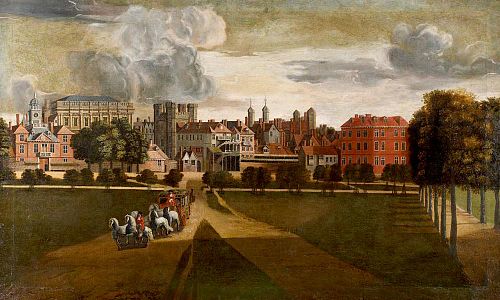Historical Overview of the Year 1698
1698 (MDCXCVIII) was a common year beginning on Wednesday in the Gregorian calendar and Saturday in the Julian calendar. It marks the 1698th year of the Common Era (CE) and the Anno Domini (AD) system, the 698th year of the 2nd millennium, the 98th year of the 17th century, and the 9th year of the 1690s decade. At the start of 1698, the Gregorian calendar was 10 days ahead of the Julian calendar, which remained in use in some regions until 1923.
Key Events
January–March
- January 1 – The Abenaki tribe and Massachusetts colonists sign a treaty, concluding the conflict in New England.
- January 4 – The Palace of Whitehall in London, England is destroyed by fire.
- January 23 – George Louis becomes Elector of Hanover following the death of his father, Ernest Augustus, paving the way for his future kingship in Great Britain.
- January 30 – Pirate William Kidd, initially authorized as a privateer, becomes an outlaw after seizing the Indian ship, the Quedagh Merchant.
- February 17 – The Maratha Empire fort at Gingee falls after nearly nine years of siege by the Mughal Empire, leading to a reward for General Swarup Singh Bundela.
- March 8 – The Society for Promoting Christian Knowledge is founded in London by Thomas Bray and others.
- During March, English Bishop Jeremy Collier publishes a pamphlet criticizing the immorality of contemporary English theater.
- Samuel Cranston is appointed governor of the Colony of Rhode Island and Providence Plantations.
April–June
- April 1 – Scottish pirate William Kidd arrives at Île Sainte-Marie, Madagascar, where most of his crew deserts him.
- April 10 – A total solar eclipse is visible in Central America.
- May 1 – The Banishment Act of 1697 comes into force for Roman Catholic officials in Ireland.
- May 4 – Sanay Min ascends as King of Burma after the death of his father.
- June 20 – An earthquake of magnitude 7.2–7.9 devastates regions around Ambato, Ecuador.
- June 21 – John Churchill, Earl of Marlborough, is reinstated in the English Army.
- June 22 – Executions of 57 leaders of the Streltsy uprising commence in Russia.
- June 24 – The Trade with Africa Act 1697 takes effect, ending the monopoly of the Royal African Company.
July–September
- July 7 – The English House of Commons is dissolved, leading to new elections.
- July 14 – Scottish settlers embark on the ill-fated Darien scheme for a colony in Panama.
- July 25 – Engineer Thomas Savery patents a steam pump.
- August 24 – King William III opens the newly elected House of Commons.
- September 5 – Tsar Peter I imposes a beard tax in Russia.
- September 8 – The Polish–Lithuanian Commonwealth defeats the Tatars in the Battle of Podhajce.
October–December
- October 11 – The Treaty of The Hague is signed among the Dutch Republic, England, and France.
- October 24 – Iberville and Bienville sail to the Gulf of Mexico to defend New France.
- November 2 – Scottish settlers establish an ill-fated colony in Panama as part of the Darien scheme.
- November 14 – The first Eddystone Lighthouse is illuminated off Plymouth, England.
- December 8 – King William III issues a proclamation of pardon for pirates in the East Indies.
- December 9 – Francis Nicholson is appointed the new British colonial governor of Virginia.
- December 12 – Mombasa is captured by the Emirate of Oman.
Significant Births
January–March
- January 1 – Leonardo VII Tocco, Italian noble (d. 1776)
- February 4 – Heinrich August de la Motte Fouqué, Prussian general (d. 1774)
- February 19 – William FitzRoy, 3rd Duke of Cleveland (d. 1774)
- March 26 – Václav Prokop Diviš, Czech inventor (d. 1765)
April–June
- April 1 – Steven Hoogendijk, watchmaker and physicist (d. 1788)
- May 1 – Francesco Robba, Italian sculptor (d. 1757)
- June 22 – Charles-Hugues Le Febvre de Saint-Marc, French playwright (d. 1769)
July–September
- August 20 – Louis Fornel, Canadian merchant (d. 1745)
- September 26 – William Cavendish, 3rd Duke of Devonshire (d. 1755)
October–December
- October 6 – François-Bernard Lépicié, French engraver (d. 1755)
- November 10 – Maria Taylor Byrd, colonial plantation manager (d. 1771)
- December 21 – Philip Wharton, 1st Duke of Wharton, Jacobite politician (d. 1731)
Notable Deaths
January–March
- January 10 – Louis-Sébastien Le Nain de Tillemont, historian (b. 1637)
- January 23 – Ernest Augustus, Elector of Hanover (b. 1629)
- March 6 – Philip Sidney, 3rd Earl of Leicester (b. 1619)
April–June
- April 6 – Mechtilde of the Blessed Sacrament, nun (b. 1614)
- May 4 – Minye Kyawhtin, King of Toungoo (b. 1651)
- June 30 – Charles Cheyne, 1st Viscount Newhaven (b. 1625)
July–September
- August 31 – Miguel Jerónimo de Molina, bishop (b. 1638)
- September 23 – Jai Singh of Mewar, Maharana (b. 1653)
October–December
- November 28 – Louis de Buade de Frontenac, Governor of New France (b. 1622)
- December 9 – José González Blázquez, bishop (b. 1630)
- December 26 – Wolfgang Julius, Count of Hohenlohe-Neuenstein (b. 1622)
Conclusion
The year 1698 was marked by significant political, cultural, and social events that shaped future developments across continents. The individuals born during this year and those who passed away left a lasting impact on various fields.

